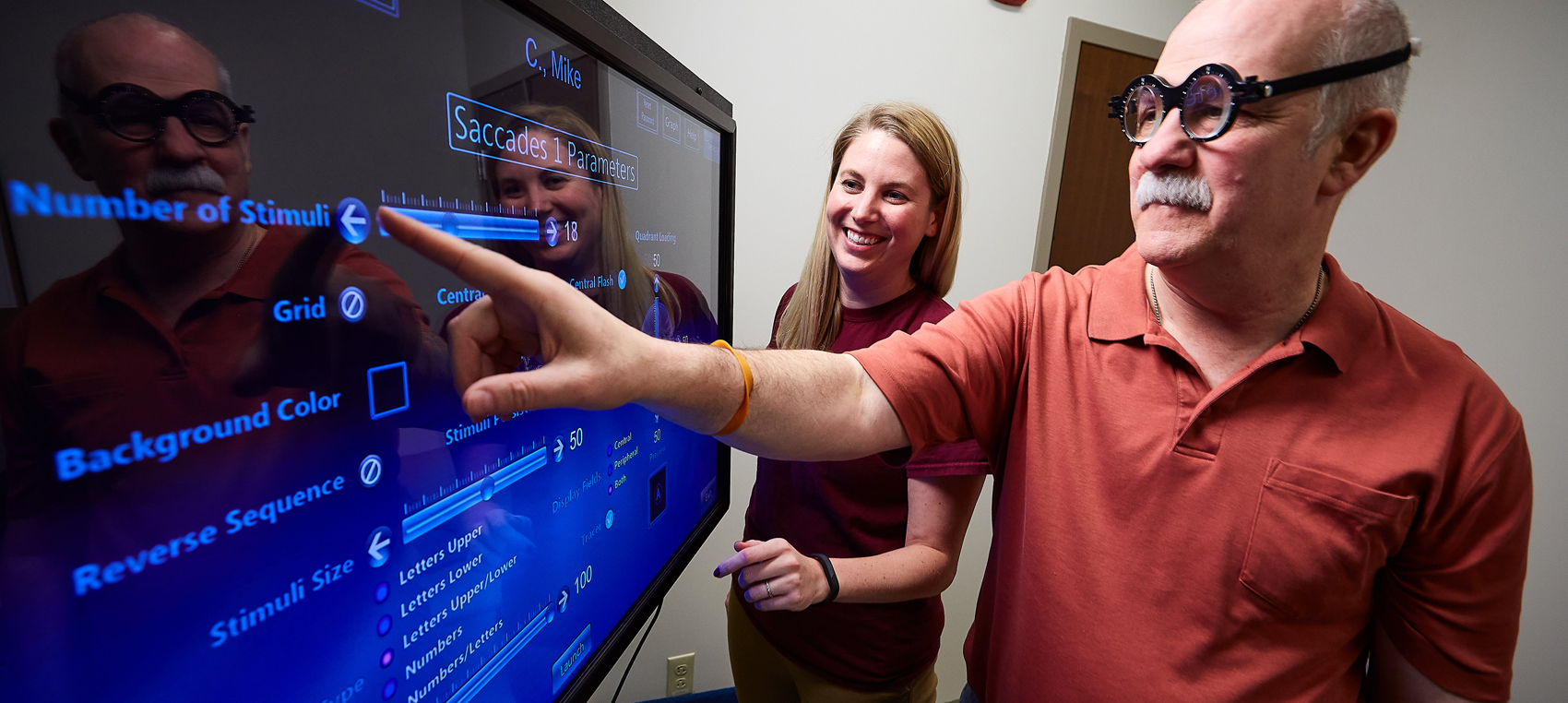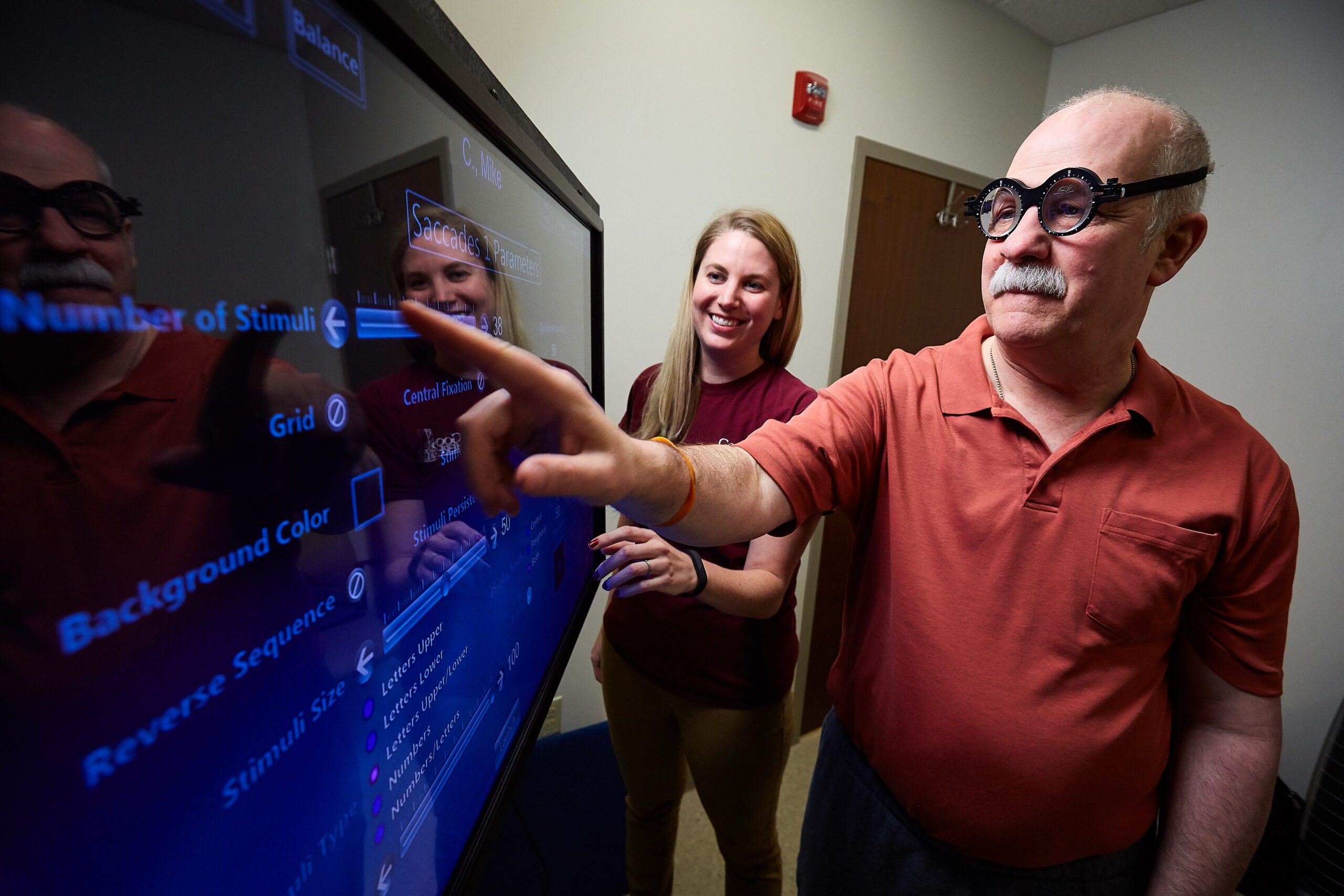Applications will re-open in Spring 2025.
Good Shepherd Rehabilitation’s Neurological Vision Rehabilitation Fellowship Program, which is accredited by the American Occupational Therapy Association, provides an intensive, is 12-month experience. This occurs concurrently with clinical practice as a treating therapist in the outpatient and inpatient settings. The fellow will attend specialty conferences, monthly physician-led rounds, special interest groups, in-services and outside seminars. This fellowship program collaborates with Jeffrey Becker, OD, of the NeuroSensory Center of Eastern Pennsylvania.
Philosophy and Primary Objective
Our program is designed to provide opportunities for clinical growth and development for fellows to become a clinically competent and well-rounded practitioner through experiential learning and collaboration with a multi-disciplinary team. This fellowship specialty area aims to provide an in-depth understanding of neurological vision deficits, an emerging area of practice with a growing body of evidence but narrowly addressed in clinical settings.
Core Elements and Goals
- Support the mission and core values of Good Shepherd Rehabilitation to improve the quality of care provided to the patients served by highly accomplished advanced practitioners.
- Develop and implement a curriculum in neurologic vision rehabilitation that includes advanced patient-centered practice, interdisciplinary training and evidence-based techniques.
- Develop the clinical and didactic teaching skills of the fellow, providing a practice environment where clinical knowledge can be shared with patients, families, students, colleagues and the public.
- Promote advancement in the field of neurological vision rehabilitation by engaging occupational therapists in activities that promote excellence and seek to discover or appraise new evidence to guide practice decisions:
- Promote community partnership through education or service projects.
Curriculum
The program combines clinical mentoring, the opportunity for advanced clinical practice, didactic information and specialty learning.
Fellowship program goals will be achieved through a combination of formal and informal educational methods and roles:
- Direct care provision as well as mentored clinical practice in outpatient vision program services of Good Shepherd Rehabilitation. Clinical mentors have specialty training and backgrounds in areas including:
- Neuro optometry
- Vision rehabilitation
- Vestibular rehabiltation
- Brain injury rehabiltation
- Spinal cord rehabilitation
- Stroke rehabilitation
- Neuro IFRAH technique
- Locomotor training
- Motor control
- Sports rehabilitation
- Interactive Metronome
- Functional Movement Systems (FMS)
- Adult autism
- Didactic learning and structured mentoring sessions
- Participation in clinical research projects
- Participation and leadership in Neurologic special interest groups
- Community outreach, endeavors project
Fellowship Course Sequence
- Weeks 1-2
- Orientation to institution
- Weeks 3-8
- Educational Curriculum
- Visual neuroanatomy lectures
- Instruction of use of specialized equipment
- Psychosocial Article Review
- Educational Curriculum
- Months 3-12
- Applied Clinical Experiences
- Direct patient care
- Mentoring sessions
- Self-study
- Observations
- Applied Clinical Experiences
- Months 4-12
- Interdisciplinary Collaboration
- Months 3, 6, 9, 12
- Evidence-Based Best Practice Article Review and Reflection
- Months 10-12
- Projects
- Local college collaboration for guest lecturing
- Development of community outreach program or service
- Months 8-12
- Participation in clinical research projects, which may include:
- Collaborating with organization’s research experts
- Analyzing clinical data
- Contributing to best practice/outcomes
- Participation in clinical research projects, which may include:
Faculty
Mentorship is a crucial element of developing advanced clinical skills. Good Shepherd has highly advanced clinical practitioners in the follow specialty areas:
- Neuro optometry
- Vision rehabilitation
- Parkinson’s BIG and LOUD program
- Vestibular rehabilitation
- Brain injury rehabilitation
- Spinal cord rehabilitation
- Stroke rehabilitation
- Neuro-IFRAH technique
- Locomotor training
- Motor control
- Sports rehabilitation
- Interactive Metronome
- Functional Movement Systems (FMS)
- Adult autism
- Clinical research
Application Requirements
The following are prerequisites for an individual to meet in order for them to enter the fellowship program:
- Graduate of an ACOTE accredited occupational therapy program
- Proof of current AOTA membership
- Submit a current resume
- Applicants are required to submit 2 letters of recommendation
- Demonstrate interest in further professional development as documented in the personal statement for admission
- Successful completion of the program will require the fellow to complete approximately 12 months in length. This will encompass all clinical, didactic and mentoring components of the program. The total program consists of four weeks of neuro-optometric training with a licensed optometrist and eleven months full program of fellowship to follow.
- Formal interview
- Current Pennsylvania license by start of the fellowship date
a. Full licensure means passing board exam and currently in possession of a valid Pennsylvania state occupational therapy license. Good Shepherd reserves the right to withdraw an applicant’s offer if no proof of full licensure is made available.
b. Out-of-state applicants are encouraged to initiate their Pennsylvania licensure at the same time an application is made to the program.
Click here for personal data sheet.
Important Dates
- Application Deadline: April 1, 2025
- Fellowship Start and End Dates: July 1, 2025 – June 30, 2026 (Tentative)
Selection Process
- The fellowship is advertised online and disseminated internally as well as to local college programs.
- Applicants submit their personal data sheet along with a full application as listed below.
- A formal interview is completed either on campus or virtually depending on the location of the applicant.
- Fellowship coordinators review applications with management and select the most appropriate candidate.
- The offer is extended; if accepted, the fellow will follow the new hire process through Human Resources as a full-time employee.
Contact Information
- Devin Darby ([email protected] or 610.776.3343)
Neurological Vision Rehabilitation Fellowship Program
Good Shepherd Rehabilitation
850 S. 5th St.
Allentown, PA 18103
Fellows are paid for 40 hours a week of clinical, teaching and education time. Salaries are not yet set and are subject to change.
Each fellow is responsible for the purchase of personal textbooks, and additional supplies and educational material. Information on requirements will be given during orientation.
Good Shepherd is an Equal Employment Opportunity employer and does not discriminate in its hiring or employment practices. All qualified applicants will receive consideration without regard to their race, color, creed, religion, national origin, age, disability, sex, sexual orientation, veteran status or any other characteristic protected by State or Federal law.


